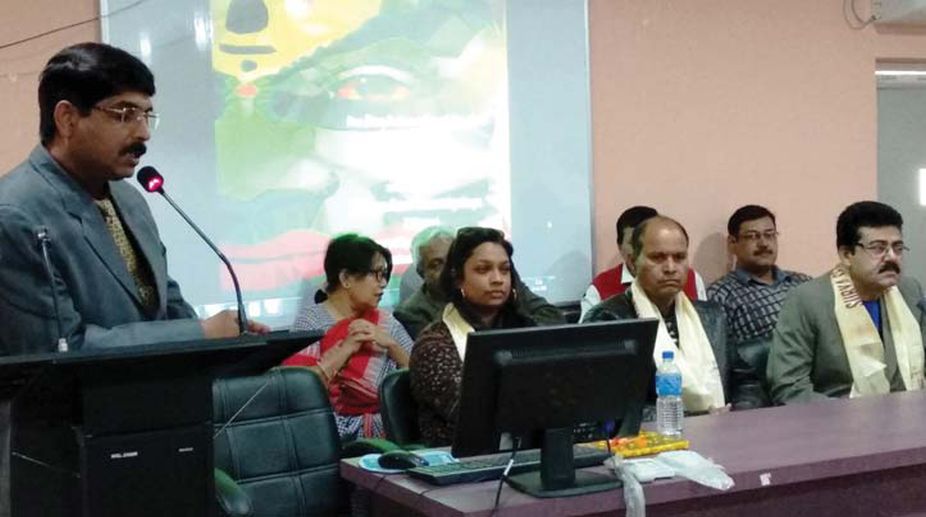Forgotten heroes
Ullaskar suffered immensely after being caught by the British and was sent to the Cellular jail in the intractable Andamans.

Internal Quality Assessment Cell
“Folk song is not for entertainment only; it is an appeal, a prayer to God, to reach out to Him,” said Rathindranath Roy, a folk artist from Bangladesh. Mr Roy, the son of Haralal Roy, another Bhawaiya artist in Bangladesh, was speaking during a one-day international seminar on ‘Transformation of Folk Songs: Ekush” organised by the Internal Quality Assessment Cell (IQAC) of the Surya Sen Mahavidhyalay (SSM) in Siliguri on Tuesday.
It may be noted that two voluntary organisations, Shikad (Root) and Sampriti (Integrity), with help from the Information and Cultural Affairs and Tourism departments of the state government, took initiatives to organise three seminars on the subject to mark International Mother Language Day that falls on 21 February.
The first seminar was held at the Siliguri College on Monday, on Tuesday’s seminar was also a part of that. The day’s event on Tuesday began after the inauguration of a well-equipped IQAC room that has been built following the guidelines of the National Accreditation and Assessment Council (NAAC). Organisers will be conducting another seminar tomorrow and then take out a rally to mark ‘Bhasha Diwas’ in Siliguri.
Advertisement
In his inaugural speech, the principal of Surya Sen Mahavidhyalay, Pranab K Mishra, welcomed chief guest Alvin Dilip Bagchi, a writer and poet from Canada, Pankaja Kirtana Patroo, a resident of Mauritius who studied music at Rabindra Bharati in Kolkata, Head of the department of Folk Culture at Kalyani University, Asimananda Ganguly, North Bengal University’s administrative official Nupur Das and others associated with educational institutions, including the governing body presidents of Siliguri College and SSM, Jayanta Kar and Krishna Chandra Paul, respectively. Apart from the discussions on folk songs, several speakers appreciated the venture taken up by the SSM and discussed how it has developed fast.
As Mr Kar narrated the objectives of the seminar and the transformation of folk songs in the 21st century by recalling folk songs of Abbasuddin, Gosthogopal and Haralal Roy, Mr Bagchi, the writer of a book ‘Baglar Sthapoti,’ recalled memories of Netaji, Khudiram, Surya Sen and the then Banga Bandhu Sheikh Mujibar Rahman and his relentless fight against Urdu language since 1948 to 21 February 1952 (8th Falgun).
On the other hand, significantly, Ms Patroo, in her speech, said: “India has given us many things, including some languages. I would have been nothing without Bengal on Tuesday.” In the second half, IQAC organised the Haralal Roy Memorial Lecture. Rathindranath Roy, a resident of Nilfamari in Bangladesh, and the main speaker, narrated the complete life history of his father–how Haralal Roy, a doctor by profession, was involved in folk world and composed Bhawaiya songs.
He also disclosed how and why he had to leave Kolkata and could not settle in India after partition in 1947 after facing turmoil due to political reasons. Mr Roy, who started his career as a singer during his school days, said: “Folk song as well as Bhawaiya song is not entertainment, it is an appeal, a prayer to God, just to reach out to Him.” Citing some examples and quoting some songs, Mr Roy said: “A folk artist sings songs from his soul.
A sacred soul is a must to sing folk songs perfectly.” During an interactive session, Mr Roy also appreciated experiments on folk songs without distorting their root. “Some singers, who have added some modern musical instruments, have started experimenting on folk songs and in some cases they have changed its basic root,” he said.
“Despite such experiments, Bhawaiya will sustain with its own tradition in original areas from the foot of the Himalayas to Rangpur and Dinajpur in Bangladesh, including a large part of Assam,” Mr Roy told The Statesman later. “People still love the songs and sing them with the help of Do Tara (two-stringed musical instrument) and this will live on,” he added.
Folk Culture HoD of Kalyani University, Mr Ganguly, appreciated Mr Roy’s observations on evolution based on geographical location of the song. “Though Haralal Roy did not get recognition in the national level, the seminar on him, organised by the SSM, is certainly recognition for him,” he said. Mr Roy sang two songs during the seminar before the beginning of its technical (third) session.
Advertisement